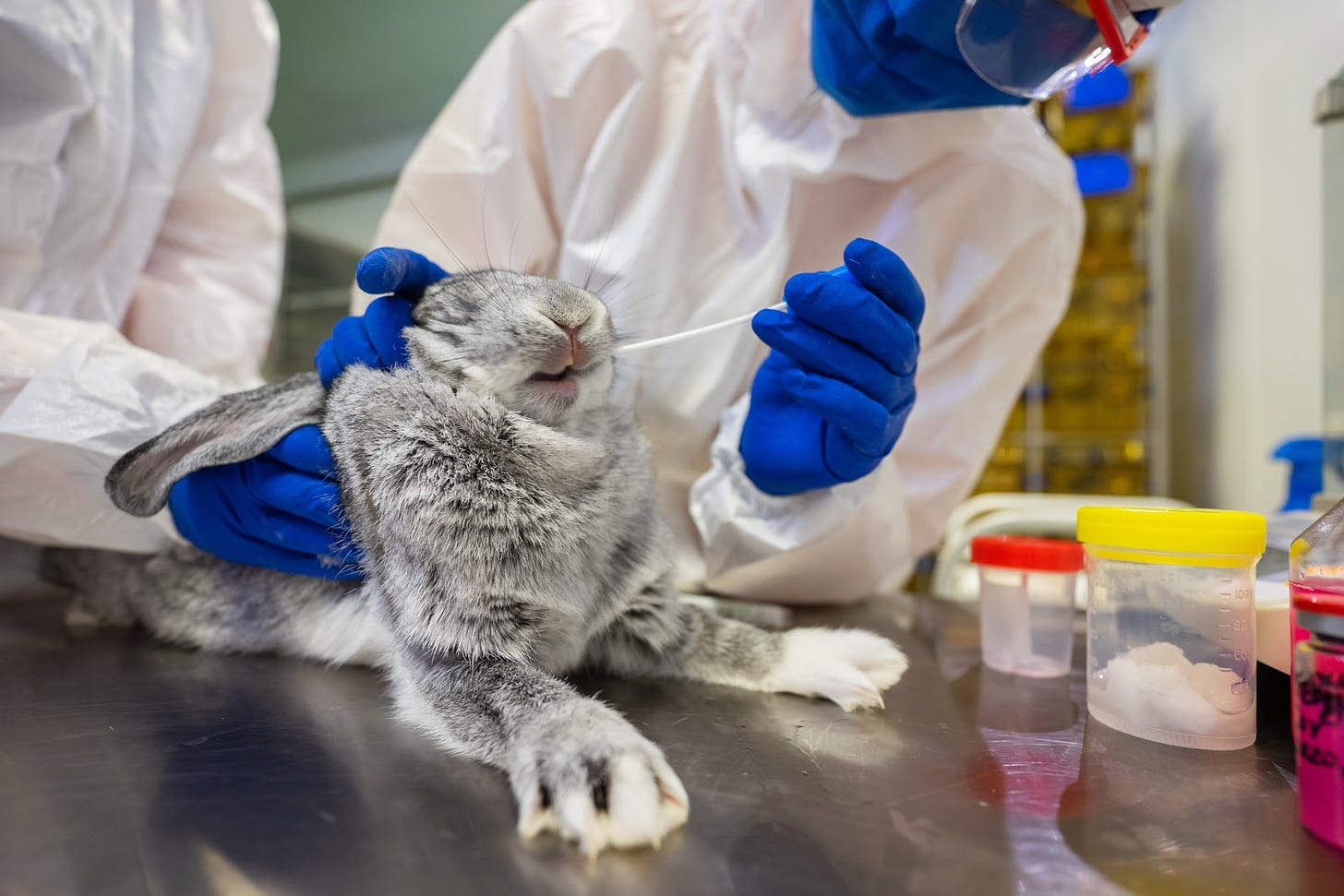The promise of COVID-19 animal vaccine
Hi there!
What a week.
My Siberian husky Zoya is particularly excited about this science news: Russia registered the world’s first COVID-19 animal vaccine, and the world had a lot of questions about it.
Every new COVID-19 vaccine developed by Russia comes with a dose of skepticism. But here's what you need to know about the Carnivak-Cov vaccine (catchy, isn’t it?).
It was developed by Rosselkhoznadzor, the Federal Service for Veterinary and Phytosanitary Surveillance, which began the clinical trials of Carnivak-Cov in October. The service expects mass production of the vaccine to kick off this month.
The latest report from the World Health Organization, released last week, shows that animal markets played a key role in the start of the spread. It’s plausible then that animal populations will be key to cracking the pandemic.
The animal vaccine will be crucial to containing the virus--and its ongoing mutations and variants--in the long term. Denmark, for example, had to kill millions of farmed mink after discovering that a COVID-19 variant transferred from a mink to a human. Russian scientists believe that animal vaccinations can prevent “development of viral mutations, which occur most often through interspecies transmissions,” according to a statement on Rosselkhoznadzor’s website.
The research hasn’t been independently reviewed, but U.S. companies like Medgene Labs and Zoetis are also developing COVID-19 vaccines for animals. They also say it will help prevent cross-species transmission and variant mutations. Apes in the San Diego Zoo received Zoetis’ COVID-19 vaccine earlier this year, and the company is developing the vaccine for mink.
Russian scientists tested the vaccine on domestic animals, as well as others, such as foxes and rabbits. Now you can take care of your dog, cat, rabbit, pet fox or mink. And no, it won’t make your pets speak Russian.
I also spoke to the Russian VC fund Leta Capital about their investment thesis and why they think Russian founders have “immense unrealized potential.”
Got questions or story ideas? Drop me a line at Daria@RussianTechNews.com.
Daria
E-COMMERCE
> COVID-19 pandemic is driving Russia’s top e-commerce retailer to European expansion. Russian brand Wildberries is opening in Germany, Italy, France, Spain and Poland. Wildberries CEO,Russia’s richest woman according to the Bloomberg Billionaires Index, was able to outmaneuver rivals to gain a 14% market share at home.
> Sber, previously known as Sberbank, finalized transaction acquiring 85% stake in Goods.ru, while M.Video-Eldorado Group will retain 10%, which could lead to “increased competition in the Russian e-commerce space, potentially affecting the likes of OZON and Yandex.Market," according to Sova Capital.
[Source: Intellinews]
FINTECH
> Trouble in Sber and Mail.ru’s paradise: the state-run bank and the owner of Russia’s biggest social network “plan to break up a $1.6bn joint venture,” Financial Times reports. The JV, which was set up in December 2019, includes food delivery app Delivery Club and Citymobil, a taxi app. It’s part of Sber’s long-standing ambition to move beyond finance and become a tech company.
[Source: FT]
HEALTH CARE
> Russia develops a tourism program offering vaccine packages. Travel agencies in Turkey and other countries are already negotiating packages that include accommodation, airline tickets and vaccine doses.
[Sources: Reuters, Hurriyet Daily News]
> Moscow mayor’s office will create an organization dedicated to health care innovation, Vedomosti reports.
[Source: Vedomosti]
> Argentina’s president tested positive for COVID-19 after two doses of Sputnik V.
[Source: Axios]
SPACE TECH
> Russian scientists found out Venus has 10,000-times less ozone at 85-100 kilometers than Earth’s atmosphere. Russia’s Roscosmos was planning a mission to Venus in 2029.
[Source: TASS, American Chemical Society]
> Russian military satellite Kosmos 2525 broke apart over Pacific Ocean, according to U.S. Air Force data published by space-track.org. It’s among the growing number of unaccounted debris that’s floating in space.
> S-70 Okhotnik will combine drones with manned fighter jets. Russian defense giant Rostec has drawn up a prototype combat drone. Production is slated to start in 2024, which would mark “a change in how Russia plans its warfighting, both at the level of campaigns and at the smaller level of battles,” according to Popular Science.
[Source: Popular Science, TASS]
INVESTOR PERSPECTIVE: LETA CAPITAL
Russian Entrepreneurial Talent as an Investment Thesis
Since the Soviet Union’s dissolution in 1991, many foreign investors have “discovered” Russia. It’s mostly through their lens that the rest of the world has learned about the perils and opportunities of investing in Russian companies.
While competition in technology and space have been going on for decades, it is a fairly recent development in the venture capital universe. And the VC market in Russia is still relatively nascent and faces its own obstacles. However, Russian VC firms and entrepreneurs have matured over the past decade. Many have international experience, have set up international teams or became investors themselves.
Even though the total volume of VC investments in Russia shrunk 20% to $702.8 million last year compared to a year before, the number of transactions increased 14% in 2020 and corporations became more active in the VC space in terms of the number of deals and total volume of investments, according to Dsight, a Russian research firm.
I spoke to a Russian VC fund to find out what makes Moscow-based VC funds excited about Russian entrepreneurs and why the post-pandemic world and remote teams are so well-suited for Russian founders.
In 2003 Alexander Chachava launched IT company LETA with $5000 in capital, becoming one of the 50 biggest IT companies in Russia after five years. Later he set up the Russian office for the international company ESET, distributing NOD32 antivirus software and reaching second biggest market share.
He gradually moved from being an entrepreneur to founding Leta Group and acquiring shares of several companies, including Group-IB and ASK. After selling these shares, he founded LETA Capital in 2012.
Over the next eight years, the fund has raised over $65 million, investing in over 20 startups.
Their investments include Russia’s ride-sharing company InDriver (Leta invested $5 million in 2017 and then $10 million a year later) and a startup leveraging big data for financial services called Double Data. Leta’s portfolio also includes Bright Box, an IT company that focuses on the automotive industry and counts Kia, Hyundai and Nissan among its customers, as well as Unomy, an Israeli sales and marketing platform.
2017 was a big year for LETA Capital: exits include Bright Box, which was acquired by Zurich Insurance Group, and Unomy, which WeWork bought to help them scale enterprise client sales around the globe.
Russia’s talent pool remains competitive globally due to early education requirements that include STEM courses. Russia produces more engineering graduates than any other country, nearly half a million a year according to data compiled by Coursera.
Coursera’s Global Skills Index for 2020 also ranks Russia highly on technology and data science skills, but notes the business skills continue to lag.
“While the country is highly competitive in tech and data science skills, it currently lacks the startup pipeline to help its talented IT experts secure high-paying jobs,” the report noted.
For investors like Chachava, this presents an opportunity. Leta Capital sees the value of the talent pool, but also the intellectual property they create.
“The era of Russian-speaking entrepreneurs is coming, they have immense unrealized potential,” he says. “I believe that my mission and the mission of my venture fund is to support these people on the path to success.”





